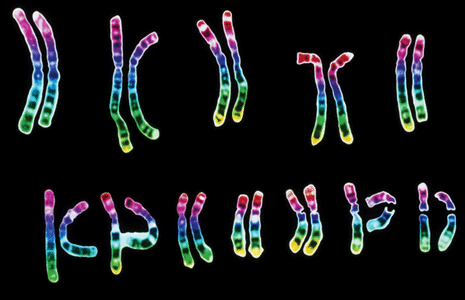Supreme Court Hears Arguments on Patenting Genes
Tuesday, April 23rd, 2013April 23, 2013
The United States Supreme Court recently heard arguments challenging the legality of patenting genes. The case concerns patents granted to Myriad Genetics, a biotechnology company based in Salt Lake City, for isolating two human genes–BRCA1 (breast cancer type 1 susceptibility protein) and BRCA2 (breast cancer type 2 susceptibility protein) in 1994 and 1995, respectively. Mutations in these genes increase the risk that a woman will develop certain types of cancers. The court’s decision could have a profound impact on medical and genetic research in the United States, affecting everything from the development of life-saving drugs and medical tests to genetically modified crops.
A patent is a document issued by a government granting an inventor exclusive rights to an invention for a limited time. The invention must be new, useful, original, and not easily discovered or created.

Chromosomes, made up of long strands of tightly coiled DNA, generally occur in pairs. This photograph shows 12 of the 23 pairs of chromosomes that occur in most human body cells. Copyright L. Willatt, Photo Researchers
Genes determine which characteristics living things inherit from their parents. One complete set of human genes is called a genome. Scientists have found that the human genome is made up of about 25,000 genes. Since 1982, patents have been granted in the United States for more than 4,000 human genes. A patent on a gene gives the company that discovered it exclusive rights to produce drugs, diagnostic tests, or other tools based on that gene.
Myriad Genetics was the first group to isolate the BRCA genes. They discovered that women who inherit mutations in the BRCA1 and BRCA2 genes have a significantly greater lifetime risk of developing breast and ovarian cancer than women who do not. Because Myriad holds a patent on these genes, doctors must purchase a blood test developed by Myriad to determine if a patient has the mutated version of either gene. Each test costs about $3,000 dollars. In addition, the patent restricts other scientists from conducting their own research on BRCA genes.
The legal case against Myriad Genetics began in in 2009 when plaintiffs filed suit against the company. The plaintiffs in this case included researchers, patients and cancer survivors, breast cancer and women’s health groups, and scientific associations, all of which are being represented by the American Civil Liberties Union (ACLU) and the Public Patent Foundation. In 2010, a New York court ruled that the patents on the BRCA genes were invalid. Myriad Genetics appealed, and after several cases, the U.S. Court of Appeals ruled that human genes can be patented. This decision is now being appealed to the Supreme Court.
Attorneys for Myriad Genetics claim that companies should be allowed to own the discoveries they make through a patent. They claim that private companies will have no incentive to conduct important scientific research if they cannot profit from the results.
The plaintiffs argue that human genes are products of nature. Every cell in every person has copies of the BRCA genes. Under U.S. patent law, such products of nature may not be patented. The plaintiffs claim that such patents actually prevent useful scientific research because they restrict other scientists from conducting research on patented genes.
The Supreme Court’s decision on this case is expected in June 2013.
Additional World Book articles:


